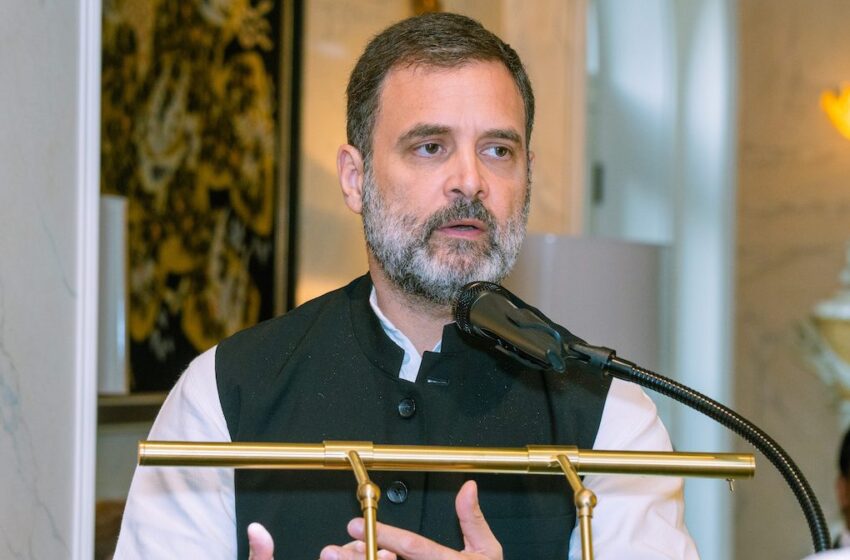Rahul Gandhi’s vision for India’s AI future: A wake-up call

India’s Congress party leader Rahul Gandhi speaking at a dinner at the Potomac, MD, home of Indian American philanthropist Frank Islam on June 1, 2023. Image Courtesy: Balachandran
Indian opposition Congress party leader advocates a strategic partnership with the U.S. in AI and advanced manufacturing
By Sreedhar Potarazu
In a compelling address to Indian Parliament this week, opposition leader Rahul Gandhi articulated a vision for India’s future that resonated deeply with those concerned about the nation’s trajectory in the realms of technology, manufacturing, and global alliances.
The Congress party leader’s emphasis on artificial intelligence (AI), the imperative to bolster domestic production, reduce dependence on China, and strengthen ties with the United States was both timely and insightful.
READ: Tulsi Gabbard slams Democrats over ‘Putin, Modi’ puppet charge (February 1st, 2025)
Gandhi astutely highlighted that AI’s efficacy is intrinsically linked to data. He pointed out that while AI is a powerful tool, it’s “absolutely meaningless because AI operates on top of data.” He emphasized that China currently dominates the data landscape, owning “every single piece of data that comes out of the production system in the world.”
This data supremacy grants China a significant advantage in AI development, potentially leaving India a decade behind. He also importantly emphasized how major U.S. platforms operating in India control consumer data.
Gandhi also addressed the pressing issue of India’s manufacturing sector. He candidly stated that the ‘Make in India’ initiative, despite its noble intentions, has not achieved its desired outcomes. As reported by the Hindustan Times, he linked this shortfall to increased Chinese presence, asserting, “The reason China is inside our territory is because Make in India has failed.”
This is best evidenced in where India stands in the manufacturing of semiconductors. This issue has been brought to the forefront with the announcement of China’ s equivalent to OpenAI — DeepSeek. The U.S. has taken aggressive measures to limit Nvidia’s sale of microprocessors to China, but time will tell ultimately how this plays out.
Nowhere is India’s manufacturing shortfall more apparent than in semiconductor production. According to various media reports, as of 2022, the global distribution of semiconductor manufacturing capacity is heavily concentrated in East Asia: Taiwan dominates with 68% of the global market; Along with Taiwan, South Korea and China control nearly 70% of global semiconductor production; and the global share of the United States, once a leader, has fallen from 37% in 1990 to a projected 14% by 2032.
India’s contribution to global semiconductor production remains negligible, highlighting the urgency of developing a robust domestic semiconductor industry to reduce reliance on imports and enhance technological self-sufficiency.
The other limiting factor in the scaling of artificial intelligence is energy and data centers. Reliance Industries chairman Mukesh Ambani recently announced that he would invest in building the world’s largest data centers. While this announcement is laudable, the reality is that until India’s capacity to generate self sustaining energy is met any investment in data infrastructure will be premature.
In light of these challenges, Gandhi advocated for a strategic partnership with the United States, particularly in AI and advanced manufacturing. He emphasized as per a Hindustan Times report, that such an alliance should focus on collaborative efforts in the AI revolution, stating, “India is as important as the U.S. for the simple reason that they cannot build an industrial system without us.”
Rahul Gandhi’s speech was a compelling blend of critique and vision. He not only identified the gaps in our current policies but also charted a course for India’s future. His emphasis on developing indigenous data infrastructure, revitalizing manufacturing, reducing dependence on China, and aligning with the United States in the AI domain offers a comprehensive strategy to navigate the complexities of the modern world.
His address serves as a pivotal moment, urging policymakers and citizens alike to reflect on our current path and consider the strategic shifts necessary to secure India’s place in the global future. The time for action is now.
(Sreedhar Potarazu, MD MBA, is an ophthalmologist and entrepreneur with experience in AI and data analytics)
